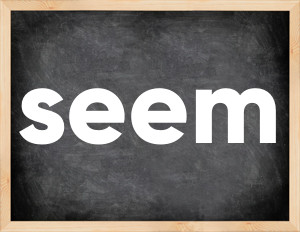 The English verb 'seem' is pronounced as [ˈsiːm].
The English verb 'seem' is pronounced as [ˈsiːm].
Related to:
regular verbs.
3 forms of verb seem: Infinitive (seem), Past Simple - (seemed), Past Participle - (seemed).
Here are the past tense forms of the verb seem
👉 Forms of verb seem in future and past simple and past participle.
❓ What is the past tense of seem.
Seem: Past, Present, and Participle Forms
| Base Form | Past Simple | Past Participle |
|---|---|---|
| seem [ˈsiːm] |
seemed [ˈsiːmd] |
seemed [ˈsiːmd] |
What are the 2nd and 3rd forms of the verb seem?
🎓 What are the past simple, future simple, present perfect, past perfect, and future perfect forms of the base form (infinitive) 'seem'?
Learn the three forms of the English verb 'seem'
- the first form (V1) is 'seem' used in present simple and future simple tenses.
- the second form (V2) is 'seemed' used in past simple tense.
- the third form (V3) is 'seemed' used in present perfect and past perfect tenses.
What are the past tense and past participle of seem?
The past tense and past participle of seem are: seem in past simple is seemed, and past participle is seemed.
What is the past tense of seem?
The past tense of the verb "seem" is "seemed", and the past participle is "seemed".
Verb Tenses
Past simple — seem in past simple seemed
(V2).
Future simple — seem in future simple is seem (will + V1).
Present Perfect — seem in present perfect tense is
seemed
(have/has + V3).
Past Perfect — seem in past perfect tense is
seemed
(had + V3).
seem regular or irregular verb?
👉 Is 'seem' a regular or irregular verb? The verb 'seem' is regular verb.
Examples of Verb seem in Sentences
- I seemed to hear somebody calling my name (Past Simple)
- He doesn't seem to know you (Present Simple)
- They seemed to be the perfect couple (Past Simple)
- Sorry, sir. Seems like you have the wrong ticket (Present Simple)
- He seems like he liked it (Past Simple)
- I barely know you, but you seem upset (Present Simple)
- It seems as if he knows more than he claims (Present Simple)
- It seems you made quite the impression on everyone (Past Simple)
- It seemed easier than I thought (Past Simple)
- You seem to spend a lot of time on your hair